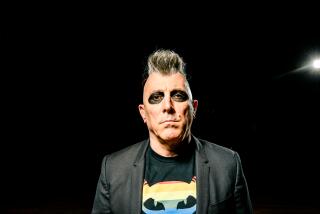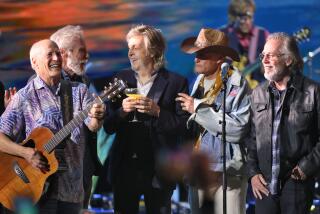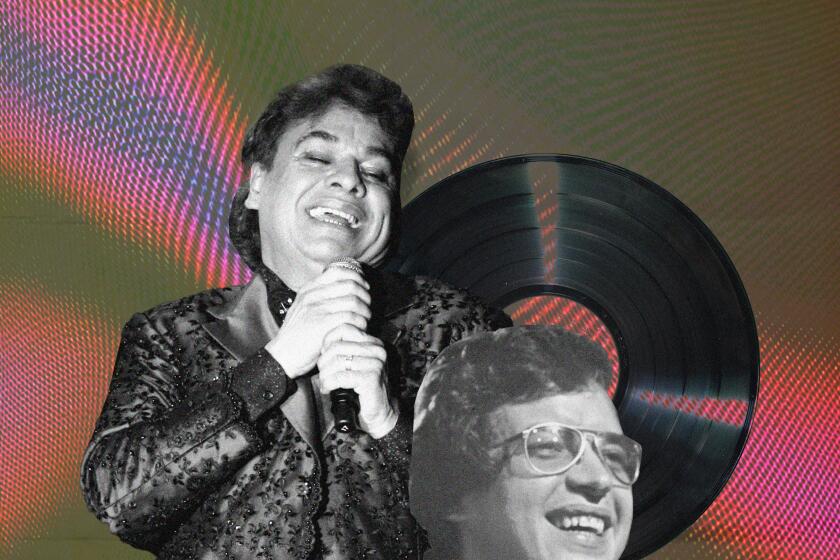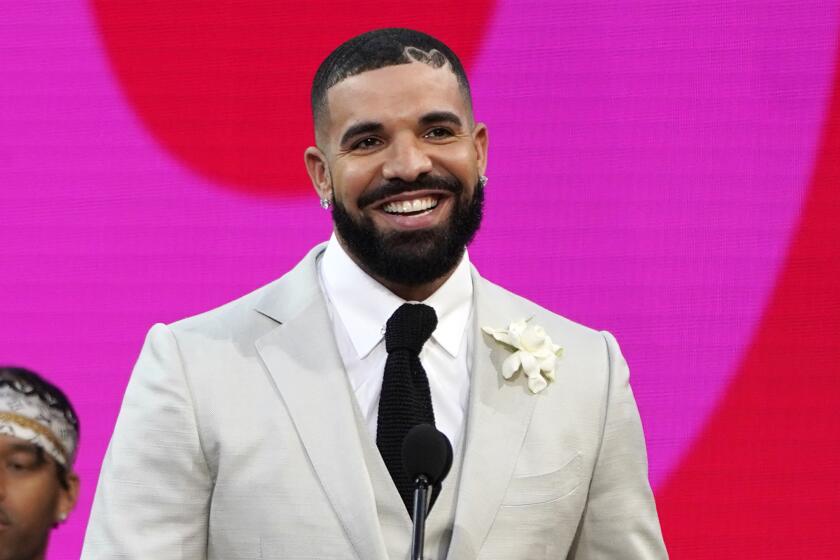Steve Aoki
Before Steve Aoki became the star of the L.A. indie rock scene-- before his Hollywood record label, before his celebrity as a DJ, before his clothing line and his corporate sponsors--before all that, there was a 13-year-old boy in Newport Beach.
He was lonely and impressionable. His parents had been divorced since he was a baby. His mother, an immigrant, spoke Japanese at home. His father, the founder of the Benihana restaurant chain, was on the other side of the country, a faraway rich man whom the boy saw on vacations. The boy’s house was a far cry from lavish; he lived with his mom, his grandfather and his two much-older siblings in a bluff-top development of suburban tract houses. Classmates who visited remember an exotic place where “the shoes came off when you walked in” and “there was always rice cooking.” Once, when he was in grade school, his best friend was co-opted by the kid brother of a skinhead and the two hid behind a bush and threw rocks at him, shouting racial epithets as he rode past on his bicycle. Another time, a kid at the local pizza place conned him into dropping acid--an experience so terrifying that he didn’t touch another inebriant for eight years.
“I wanted to be like every other kid,” he would later remember, “but I could never fit in.”
One day, a kid in his class gave him a mix tape. The music was like nothing the boy had ever heard. It was wild, thrashing, powerful. The bands were outsiders, with exotic names like Minor Threat and Gorilla Biscuits. The boy listened, and listened some more, bought a turntable, and began obsessively collecting records. By his senior year at Newport Harbor High School in 1995, he had morphed, almost magically, into a teetotaling vegetarian skateboarder with bleached Raggedy Andy hair and a burgeoning music collection. He knew about four people who were even remotely like him, and even among them he felt like an outcast. His bronzed, buff, conventional Caucasian classmates voted him “Most Unpredictable.”
He didn’t care. By college, still sober as a parson, he was on a mission, producing do-it-yourself records on a shoestring and running underground concerts out of the living room of his UC Santa Barbara apartment. By his early 20s, he had his own record company, named Dim Mak--”Death Touch”--in honor of Bruce Lee, his childhood hero, the only Asian, he would later observe, who was rooted for by people of every race and creed. It didn’t make much money but it was his, launched (and still run) without a dime from his father.
“Music became my community,” the 29-year-old Aoki explains now, sitting on a battered couch in Dim Mak’s Hollywood office, his cellphone and BlackBerry ringing incessantly while two European rock bands wait to see him. In photos, his long hair and Fu Manchu mustache make him look like a Hawaiian dope dealer, but in person he’s ebullient and waif-like, a former women’s studies major who has lived for the last five years in a low-rent fourplex with his college sweetheart.
His leg jiggles nervously when he talks, and periodically he hops to his feet or, when particularly excited, leaps like a cartoon character onto the big green desk in his office. The ring on his phone is a comical man’s voice: “Pick up the phooooooonnne!” it hollers.
“Music was where I fit,” he says. “Music became a central focus of what I wanted to be part of. That mix tape--” He laughs out loud at the randomness of it. “That mix tape--it changed everything.”
Rock ‘n’ roll, at its heart, is a thrilling fable, a story in which three chords and a little magic turn a lonely outsider into his one true self, a figure of enchantment, maybe even a prince.
Steve Aoki’s is a rock ‘n’ roll story, but it’s also a story about everything changing, about the shifting crosscurrents that are delivering more and more of that magic into the hands of outsiders. In the new cultural order--the post-Napster landscape of digital downloads and online hipster society pages, of MySpace and Facebook, of limitless choice and globalization--consumers who once followed the lead of big media companies are now as likely to turn to charismatic tastemakers such as Aoki who are known and trusted within a particular market niche.
Never mind that Aoki’s “offices” are in an unheated, falling-apart bungalow on a Cahuenga Boulevard weed patch, or that his car was his big brother’s 14-year-old Isuzu Rodeo until this year, when he splurged on a Prius. If his trappings are less than impressive, they’re more than made up for by his growing cultural influence.
By day, Aoki runs Dim Mak Records, the small indie label that jump-started the career of the British neo-pop sensation Bloc Party and that has more recently imported such rising European stars as Klaxons, Scanners, Whitey and Mystery Jets. By night he is a wildly popular club promoter and DJ whose venues range from hole-in-the-wall Hollywood after-parties to massive Tokyo “superclubs” and $10,000-a-gig corporate events.
His Dim Mak Collection clothing line, launched last year, has become an unofficial must-have for aspiring hipsters (the crowds at the recent “South by Southwest” festival in Austin, Texas, were peppered with dinosaur-patterned, zippered Dim Mak hoodies). He is a budding record producer who has teamed up with Blake Miller of the L.A.-based band Moving Units to produce about half a dozen remixes.
And then there are his famous friends, from the hipster photographer Mark “The Cobrasnake” Hunter to Aoki’s half-sister, the model/actress Devon Aoki, to Hollywood’s most poignant and ubiquitous celebrity adolescent, Lindsay Lohan, who leaped from her banquette to hug him as he arrived for a recent gig at the packed Hollywood club LAX.
“If you go out in L.A. at all, you know about Steve Aoki,” says longtime Los Angeles public relations consultant Susan Mainzer, who has been involved with dance music for 15 years.
“He has the hip factor--he has that following,” agrees Janine Blain, West Coast director of the Doneger Group, a fashion industry trend and business consulting firm whose members, when asked, knew all about him.
“Hey, man!” a twentysomething guy in a T-shirt gushed to him at LAX, pumping Aoki’s hand and motioning his girlfriend over to take a picture. “I’m a DJ! I wanna tell you, I play all your remixes!”
“So I saw you in GQ,” a tattooed girl with a Bettie Page haircut chimed in over the throbbing music. “So how was that? Weird?”
“Not really,” Aoki replied, as another fan tugged at his arm for attention.
“So, um, are you still with your girlfriend?”
But Aoki’s influence stems from a delicate balancing act that worries his fans and fuels his critics, and that, in the long haul, could prove to be either the next phase of youth culture or impossible to sustain. In one of his life’s many ironies, the factors that isolated him as an adolescent--his non-whiteness, his music-geek knowledge, his celebrity surname, his innocent enthusiasm--have conspired to make him appealing as a crossover figure.
Because of his celebrity as a DJ, he is at the center of the international club circuit; because of his pedigree and looks, he photographs like global shorthand for the Next Generation. Because his friend Hunter photographs him a lot, Aoki’s fame is magnified on the Internet by www.thecobrasnake.com and its many imitators. (One of the most striking things about L.A. nightlife now is that everyone seems to have a camera.)
Teenagers around the world track him to see what he is wearing. Indie fans turn to his label to see what new band he’s endorsing. Club scenesters from San Francisco to Shanghai look for his name and flock to his parties.
For Aoki--who is so friendly that he reflexively calls everyone “buddy,” and so committed to Dim Mak that he was running it out of his one-bedroom apartment until 18 months ago--accommodating that lucrative mainstream to underwrite his talented have-not bands has been more than a little tempting.
And yet, as anyone who knows their rock ‘n’ roll fables can tell you, mainstream money is always the villain. Or, as Blain, the consultant, ominously put it: “This is how brands can begin.”
It’s Saturday night in Orange County, far from Cahuenga. At Tentation Ultra Lounge, a club and restaurant complex near John Wayne Airport, the young professionals have come out to play. There are velvet ropes. There are big, suited bouncers. There are girls in miniskirts and stilettos and clean-cut guys with khaki pants and open-collar dress shirts.
And there on the deck, just above the sticky, sweaty, pulsating dance floor, his long hair tamed by a headband, is Steve Aoki in a Dim Mak hoodie and white headphones, spinning--cover your eyes, indies--souped-up versions of Top 40 hits.
“Steve Aoki is one of my favorite DJs,” confides restaurant manager Omar Khashen, who says Aoki is one of several big-name disc jockeys he has brought into the club lately, including Paul Oakenfold and DJ AM. “I used to go watch him in Hollywood at Cinespace.”
Of course, Khashen concedes, the Cinespace crowd couldn’t be more different from this one--there are no torn T-shirts, no asymmetrical haircuts, no cigarette-sucking art students in black pants and blacker cardigan sweaters. Instead there are couples like the one next to the turntables, a golf-shirted man with a receding hairline hopping around an unsteady woman in high heels--perhaps the sort of people who, as children, used to snicker at Aoki.
“This is all 30-year-old mortgage brokers,” Khashen says.
Aoki cues up a little Ludacris (“Shake your money maker/Like somebody’s ‘bout to pay ya . . .”) and the crowd goes insane, almost drowning out the music as they sing along to the chorus, “Stand NEXT to this MONEY like EY! EY!”
“I think Steve is more used to dudes in red tights,” laughs Aoki’s girlfriend, Briana Burrows, a 26-year-old producer for Nippon TV who met Aoki while they were students working on an Asian American political ‘zine. “But Steve doesn’t judge. He just likes to have fun and get the crowd going.”
Up on the platform, Aoki is swaying and nodding as he manipulates two turntables and a laptop, the sleeves of his hoodie pulled way down, like a small child’s. Under the strobe lights, his face is intent and his hands are long and graceful, but from a distance, he looks almost Japanimated, all long, slender legs and big, white sneakers. The set is a far cry from the pounding indie and electro music that Aoki plays on his Hollywood home turf, at his Dim Mak Tuesdays at Cinespace and his Sunday LAX party, Banana Split Sundaes, with DJ AM.
Still, he says, “I don’t play anything I don’t like. Some of that music is great. And the physical act of DJ-ing is always fun.”
Aoki will DJ for free sometimes if the club is small and the music moves him. For this evening, however, Tentation will pay several thousand dollars that, in turn, will underwrite extra development and promotion of the bands on his label.
“Sure, the label could function without it,” he says, “but with it, we can bring Whitey out twice or push the second single for Scanners--all kinds of things I could never do before.”
That take-from-the-rich-to-give-to-the-indie strategy has underwritten some of Aoki’s favorite music. But it also has put his hipster credibility up for debate.
Aoki now regularly appears at the exclusive clubs that his true believers sneer at; next month, he’ll do a cross-country DJ tour with Danny Masterson of “That ‘70s Show,” and this summer, he’s slated to tour Europe and Asia. At one point last summer, he was DJ-ing an average of 24 nights out of 30.
He has accepted lucrative sponsorships--one deal, with WeSC apparel, landed him on a billboard in New York. Another, with the skateboard shoe company Supra, has yielded a forthcoming signature “Steve Aoki” sneaker. He is mentioned on Page Six. He appeared in a Pepsi commercial broadcast during the Super Bowl. Not long ago, he was name-checked on “Ugly Betty.” The April issue of GQ (the one with Lindsay Lohan on the cover) featured him in a promotional fashion spread for Sean Jean clothing.
And two years ago, during an especially lean period at Dim Mak, Aoki borrowed “around $10,000” from his close friends Benji and Joel Madden, the singer-songwriters from the mainstream band Good Charlotte.
“Joel and Benji are totally nice dudes. But coming from more of an indie-punk rock background, Good Charlotte as a band was never cool,” says Franki Chan, a Los Angeles DJ with whom Aoki once was friends and who is now a rival.
“I know in Steve’s heart of hearts he still clings to those original values, but from an outside view--and that’s all I have now--it’s like he’s going down the same path a lot of people go down when they start to get a little bit of fame and money,” says Chan, whose real name is Franklin Hartzell. “In my view it’s kind of like selling out.”
“He’s definitely an L.A. original, and he does represent the next generation, but most people know him for almost the wrong reasons,” says Jason Bentley, host of “Metropolis,” KCRW’s electronica and dance music showcase. “I know his heart is in the right place musically. But he has to be really careful about keeping in check his visibility in the tabloids and these cheeseball scenes.”
Aoki sees the potential conflict.
“It’s a fragile line,” he says. “I can get criticized, but if my bands are able to tour and make music that’s important to people, then I’m going to keep doing this. I could say no to these guys, but then I couldn’t afford to do what I’m doing, which is release great music that people care about.”
His friends, meanwhile, find it offensive that some are questioning his motives. “Our lifestyle is very humble,” says Burrows. “And Steve is still the same guy I’ve known forever.”
Good Charlotte’s Joel Madden chalks up the criticism to intolerance and envy. Though he and Aoki “are on different sides of the world as far as music goes,” he says he felt the moment they met that, ethically, they were kindred spirits.
“We have big dreams,” he says. “And people really hate on that.”
It is midafternoon at Dim Mak records. The rooms of the small stucco building are piled high with boxes and alive with rumpled, black-clad musicians--here’s a member of the British electro-punk band Whitey (his name is Shah, just Shah) lounging with a guitar on a pullout couch. Here’s Whitey himself (his real name is Nathan J. Whitey).
Here’s a room with four desks and five people, all with executive titles (label manager, operations manager, brand manager), none with the sort of clothing you’d wear to an office. Here’s Jacob Lee, Aoki’s assistant, who practically lives at Dim Mak, sleeping in a metal bunk bed in a room full of dinosaur-patterned clothing and bulk-packaged CDs.
And here is Aoki, this time with a quilted parka over his Dim Mak hoodie, because it is freezing outside and the windows keep blowing open and the place is unheated. No matter. Here comes another musician, this time a Norwegian named Fredrik Saroea from the indie-pop band Datarock.
He comes bearing a Datarock tracksuit, and Aoki, whose company will be releasing the band’s singles, EPs, a remix album and some Datarock apparel, holds it up in delight, then strips to his green underpants and mismatched socks to try it on. For a moment, he is just about naked, barebacked and bare-legged, shivering and curled like a comma, and he looks for all the world like a little boy, no older than 13.
Then he’s up--and he’s good! He’s Steve Aoki! Dressed and jumping on the couch now! Asking who wants to hear Datarock’s first Dim Mak single? He rushes to his computer and out comes a beat so infectious, so joyful that no one in the room can resist it. Suddenly this is so much more than a drafty dump on Cahuenga. Suddenly the whole room feels like dancing. Everything has changed, as if by magic. Aoki laughs out loud and cranks up the volume. . . .
“Pick up the phoooooone!” yells his forgotten cellphone. “Pick up the phoooooooone!”
*
(BEGIN TEXT OF INFOBOX)
4 Fast Tracks:
SCANNERS
“Bombs” A track remix
“This track was originally a rock song, but the remix turned it into a huge, percussive, almost hip-hop dance track.”
*
DOES IT OFFEND YOU YEAH?
“We Are Rockstars”
“It’s the anthem for the Banana Split Sundaes at lax that DJ AM and I do on Sundays.”
*
MYSTERY JETS
“The Boy Who Ran Away” (Riton remix)
“One of my favorites by this British band, but the remix turns it into an electro- fire rocker.”
*
JUSTICE
“D.A.N.C.E.”
“Justice, from France, has been controlling the electro game, and they threw a curve ball with this disco track.”
*
For more photos, go to latimes.com/aoki. To hear his music, www.dimmak.com
More to Read
The biggest entertainment stories
Get our big stories about Hollywood, film, television, music, arts, culture and more right in your inbox as soon as they publish.
You may occasionally receive promotional content from the Los Angeles Times.






